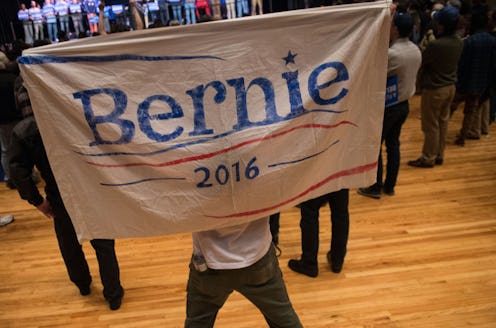News
No, Bernie Supporters Won't Jump Ship For Trump
Ever since Bernie Sanders and Donald Trump emerged as serious forces in the 2016 election, there’s been chatter about the possibility of Sanders-Trump crossover voters. The theory is that if Sanders doesn’t get the Democratic nomination, a lot of his voters will vote for Trump, and vice-versa if Trump isn’t the Republican nominee. It’s an attractive theory. But it’s also probably an incorrect one.
Proponents of this theory point to similarities between Trump and Sanders’ campaigns. Both candidates are outsiders with few ties to the Democratic or Republican Party establishments. Neither of them rely on super PACs. And both seem to channel a general frustration with the status quo and a desire to fundamentally transform the way American politics works.
All of this is true, and yet it ignores the impact of one really important factor: policies. Sure, candidates all have unique world views and campaign styles, and yes, voters are often lured by superficial qualities like personality. But we can’t just completely ignore the role that policies play in swaying voters, and Trump and Sanders supporters have wildly different policy preferences.
This was confirmed by a recent Pew poll that compared the policy views of the remaining five presidential candidates’ supporters. The big takeaway is that by and large, Sanders and Trump fans aren’t in agreement about... well, much of anything.
When asked if “immigrants today are a burden on our country,” 69 Trump supporters say yes, compared with only 14 percent of Sanders supporters. A whole 77 percent of Bernie fans think that it’s the “government’s responsibility to to ensure all have health care,” a proposition that only 14 percent of Trumpkins subscribe to. On the question of whether “U.S. Muslims should be subject to more scrutiny,” 64 percent of Trump voters think they should, while only 12 percent of Sanders supporters feel the same.
It goes on and on like that, with one more policy after another. Sanders and Trump supporters don’t even see eye-to-eye on free trade, despite some conventional wisdom to the contrary. They do agree that “Social Security benefits should not be reduced” — but then again, so do the supporters of Hillary Clinton, Ted Cruz, and John Kasich. Only on the proposition that “U.S. global involvement makes things worse” are the two groups slightly more aligned than the rest of the candidates, and even then, the differences are very small.
There’s been a strange tendency among pundits this cycle to explain the various candidates’ support by looking at everything other than their policy prescriptions. The fact of the matter, though, is that Trump’s signature policy is building a wall between the United States and Mexico, and Sanders’ signature policy is establishing a universal, government-run health care program. The candidates disagree staunchly about those issues and a whole host of others, and only by completely disregarding the significance of policies could someone reasonably conclude that the Trump-Sanders crossover vote is anything more than trivial.
Image: Pew Research Center
